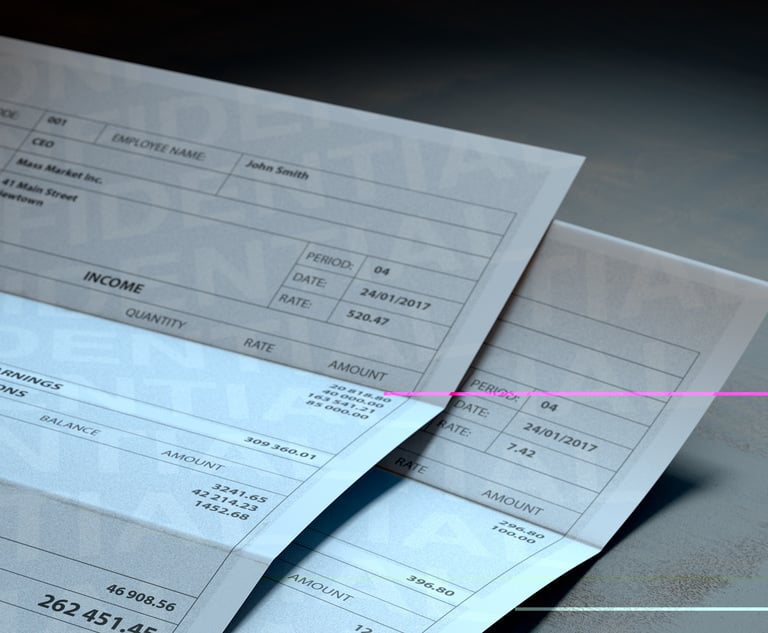Trump Twitter's Gov't Role Eyed by Judge in Free-Speech Case
In a letter Tuesday, the judge asked the government to explain why First Amendment protections it agreed kept other official accounts from blocking people didn't apply to Trump's.
March 14, 2018 at 01:58 PM
3 minute read

U.S. District Judge Naomi Reice Buchwald of the Southern District of New York has asked Justice Department attorneys to say how, exactly, President Donald Trump's personal Twitter account differs from official accounts such as @POTUS and @WhiteHouse.
In a letter to the government's attorneys Tuesday, Buchwald referred back to oral arguments held March 8 on summary judgment motions filed by both sides in Knight First Amendment Institute v. Trump. During the hearing, Buchwald's questioning centered on Trump's use of Twitter—which he famously has used in part to convey administration messages.
In the case, free-speech advocates are arguing that Trump may not block users from access to his personal Twitter account, @realDonaldTrump, the same way elected officials are unable to restrict political speech in other public forums. Buchwald was searching for a way to guarantee free-speech rights in a case where a public official uses a private account to communicate statements of official policy.
At one point, Buchwald brought up an alternative to blocking, questioning whether Trump could just “mute[] the person that he finds personally offensive,” rather than blocking them.
Buchwald did observe that not “every tweet on the account could be considered an official statement of government position.” Where then, she asked, could an appropriate line be drawn?
In her letter Tuesday, Buchwald noted that, during arguments, the government had agreed that were users to be blocked from so-called official accounts, it was “probably true that the government cannot block individuals purely on the basis of viewpoint from a government account like the @POTUS account.”
Buchwald said the court “neglected … to address the impact of this position on the question currently before” it: “whether such blocking may occur on the @RealDonaldTrump account.”
“If the government continues to take the position that users may not be blocked from the @POTUS and @WhiteHouse accounts, it should explain all of the ways in which the First Amendment analysis differs for those two accounts on the one hand and the @RealDonaldTrump account on the other,” Buchwald wrote. “If the government no longer takes the position that such blocking is unconstitutional, it should explain why such blocking is in fact permissible.”
The judge set a March 28 deadline for the government to reply, and seven-day response deadline for the plaintiffs after the government's letter.
“We're glad the judge asked this question,” said Katie Fallow, senior staff attorney at the Knight First Amendment institute at Columbia University, in an emailed message. “It's hard to understand the government's apparent position that the First Amendment would bar the president from blocking critics from the @POTUS account, but not from @realDonaldTrump—the account he uses almost daily to introduce new policies, announce nominations to key government posts, and otherwise convey important news and information about the administration.”
A spokeswoman for the DOJ declined to comment.
This content has been archived. It is available through our partners, LexisNexis® and Bloomberg Law.
To view this content, please continue to their sites.
Not a Lexis Subscriber?
Subscribe Now
Not a Bloomberg Law Subscriber?
Subscribe Now
NOT FOR REPRINT
© 2025 ALM Global, LLC, All Rights Reserved. Request academic re-use from www.copyright.com. All other uses, submit a request to [email protected]. For more information visit Asset & Logo Licensing.
You Might Like
View All
Five Years After Vega Much Remains Unsettled in Pay Frequency Litigation

Spotify GC Steps Down, Opts to 'Step Away From Full-Time Corporate Life'
2 minute read
Dechert Sues Former Attorney For Not Returning Compensation

Trending Stories
- 1Jury Seated in Glynn County Trial of Ex-Prosecutor Accused of Shielding Ahmaud Arbery's Killers
- 2Ex-Archegos CFO Gets 8-Year Prison Sentence for Fraud Scheme
- 3Judges Split Over Whether Indigent Prisoners Bringing Suit Must Each Pay Filing Fee
- 4Law Firms Report Wide Growth, Successful Billing Rate Increases and Less Merger Interest
- 5CLOs Face Mounting Pressure as Risks Mushroom and Job Duties Expand
Who Got The Work
J. Brugh Lower of Gibbons has entered an appearance for industrial equipment supplier Devco Corporation in a pending trademark infringement lawsuit. The suit, accusing the defendant of selling knock-off Graco products, was filed Dec. 18 in New Jersey District Court by Rivkin Radler on behalf of Graco Inc. and Graco Minnesota. The case, assigned to U.S. District Judge Zahid N. Quraishi, is 3:24-cv-11294, Graco Inc. et al v. Devco Corporation.
Who Got The Work
Rebecca Maller-Stein and Kent A. Yalowitz of Arnold & Porter Kaye Scholer have entered their appearances for Hanaco Venture Capital and its executives, Lior Prosor and David Frankel, in a pending securities lawsuit. The action, filed on Dec. 24 in New York Southern District Court by Zell, Aron & Co. on behalf of Goldeneye Advisors, accuses the defendants of negligently and fraudulently managing the plaintiff's $1 million investment. The case, assigned to U.S. District Judge Vernon S. Broderick, is 1:24-cv-09918, Goldeneye Advisors, LLC v. Hanaco Venture Capital, Ltd. et al.
Who Got The Work
Attorneys from A&O Shearman has stepped in as defense counsel for Toronto-Dominion Bank and other defendants in a pending securities class action. The suit, filed Dec. 11 in New York Southern District Court by Bleichmar Fonti & Auld, accuses the defendants of concealing the bank's 'pervasive' deficiencies in regards to its compliance with the Bank Secrecy Act and the quality of its anti-money laundering controls. The case, assigned to U.S. District Judge Arun Subramanian, is 1:24-cv-09445, Gonzalez v. The Toronto-Dominion Bank et al.
Who Got The Work
Crown Castle International, a Pennsylvania company providing shared communications infrastructure, has turned to Luke D. Wolf of Gordon Rees Scully Mansukhani to fend off a pending breach-of-contract lawsuit. The court action, filed Nov. 25 in Michigan Eastern District Court by Hooper Hathaway PC on behalf of The Town Residences LLC, accuses Crown Castle of failing to transfer approximately $30,000 in utility payments from T-Mobile in breach of a roof-top lease and assignment agreement. The case, assigned to U.S. District Judge Susan K. Declercq, is 2:24-cv-13131, The Town Residences LLC v. T-Mobile US, Inc. et al.
Who Got The Work
Wilfred P. Coronato and Daniel M. Schwartz of McCarter & English have stepped in as defense counsel to Electrolux Home Products Inc. in a pending product liability lawsuit. The court action, filed Nov. 26 in New York Eastern District Court by Poulos Lopiccolo PC and Nagel Rice LLP on behalf of David Stern, alleges that the defendant's refrigerators’ drawers and shelving repeatedly break and fall apart within months after purchase. The case, assigned to U.S. District Judge Joan M. Azrack, is 2:24-cv-08204, Stern v. Electrolux Home Products, Inc.
Featured Firms
Law Offices of Gary Martin Hays & Associates, P.C.
(470) 294-1674
Law Offices of Mark E. Salomone
(857) 444-6468
Smith & Hassler
(713) 739-1250






